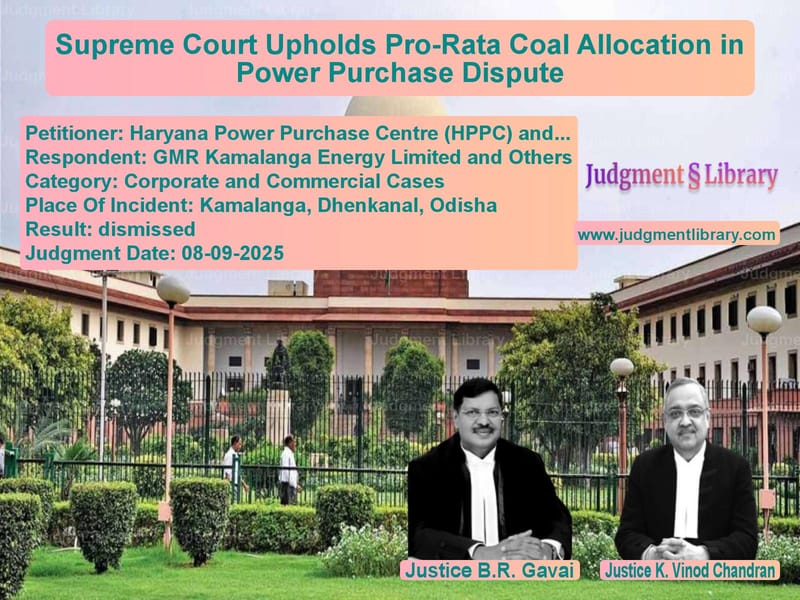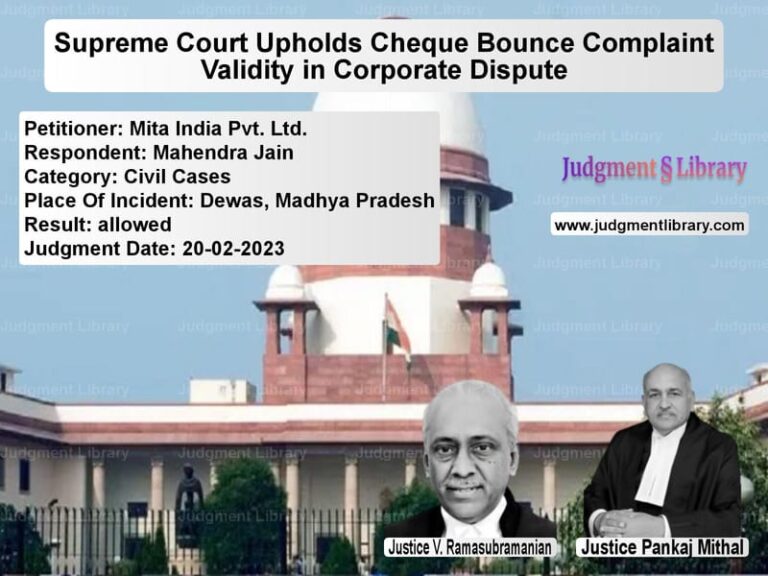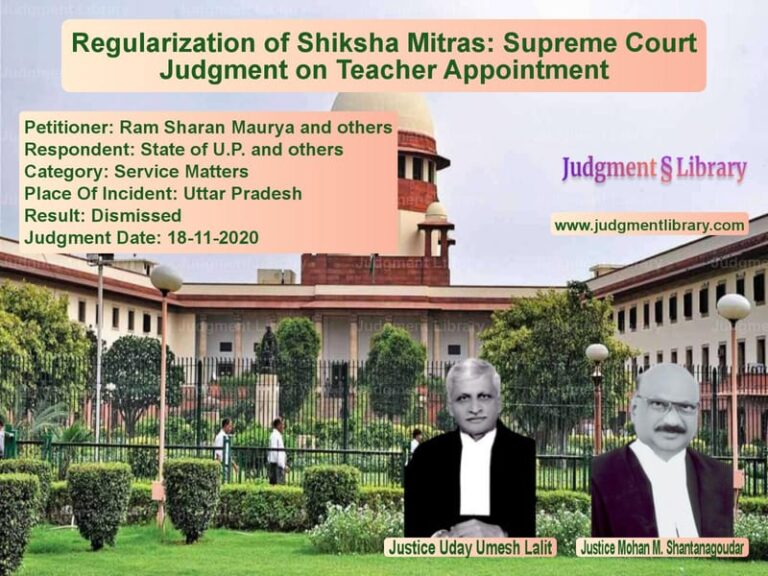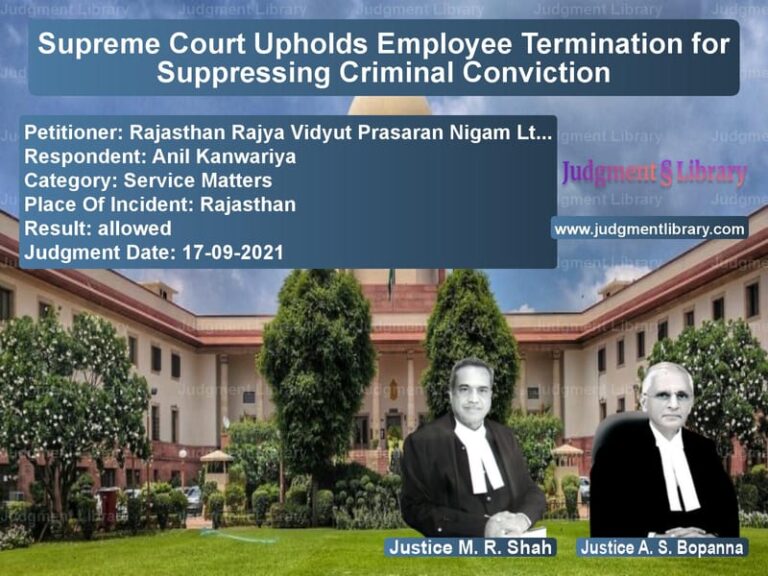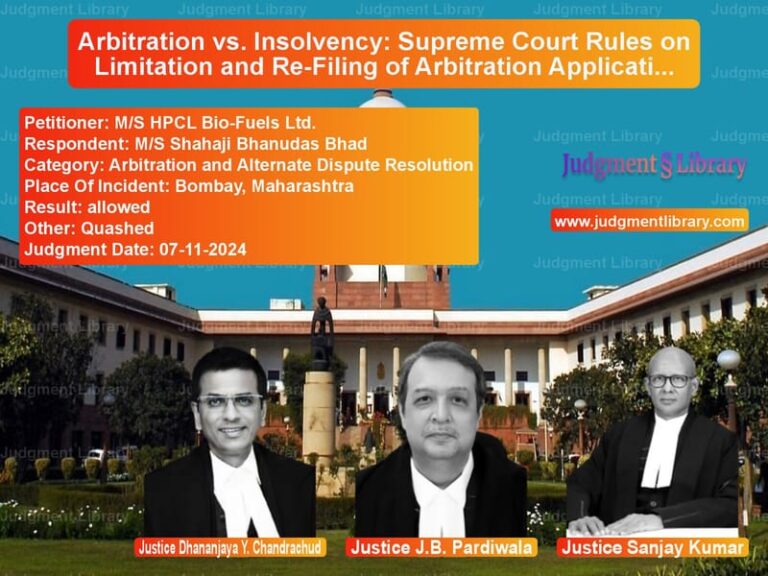Supreme Court Upholds Pro-Rata Coal Allocation in Power Purchase Dispute
The complex world of electricity regulation and power purchase agreements came under the scrutiny of the Supreme Court in a significant case involving Haryana Power Purchase Centre and GMR Kamalanga Energy Limited. This dispute, which had been winding its way through various regulatory bodies for years, centered around one fundamental question: how should the cost of coal be allocated when multiple states purchase power from the same generating station? The case represents a classic example of how changing laws and policies can create ripple effects throughout the energy sector, affecting generators, distributors, and ultimately, electricity consumers across different states.
The story begins with GMR Kamalanga Energy Limited (GKEL) setting up a thermal power plant in Odisha with a capacity of 1050 MW. The company entered into power purchase agreements with three different entities: GRIDCO (Odisha), Haryana Utilities, and Bihar Utilities. Each agreement was for a portion of the power generated, but all electricity came from the same physical plant using coal from the same sources. The controversy emerged when changes in law and coal distribution policies increased GKEL’s costs, leading to questions about how these additional costs should be shared among the three purchasing utilities.
The legal journey started when GKEL approached the Central Electricity Regulatory Commission (CERC) seeking compensation for what are known as ‘Change in Law’ events. These included increases in coal royalty, introduction of clean energy cess, excise duty on coal, and other regulatory changes that increased the company’s operating costs. The CERC, in its order dated February 3, 2016, granted relief to GKEL and devised a formula for computing additional costs that involved pro-rata allocation of coal among all three distribution companies.
Haryana Utilities initially accepted this arrangement and paid approximately Rs. 140 crores to GKEL until June 2016. However, they subsequently raised objections to the pro-rata allocation method, leading to further litigation and the filing of Petition No. 105 before the CERC. The core of Haryana’s argument was that the coal received under the Fuel Supply Agreement dated March 26, 2013 should be considered exclusively for their needs, with any shortfall to be met through more expensive imported or open market coal.
Shri M.G. Ramachandran, learned Senior Counsel appearing for the Haryana Utilities, submitted that “the Haryana Utilities would be entitled to supply of 300 MW of energy from the firm linkage whereas GRIDCO would be entitled to supply of 125 MW energy produced using the coal available from the firm linkage. It is, therefore, submitted that the Haryana Utilities cannot be burdened with the additional cost incurred on account of production of coal from the MCL tapering linkage.”
On the other side, GRIDCO argued that they had the first right to power generated from the firm linkage coal since their PPA was the earliest and the project was set up at the instance of the Government of Odisha. Shri Raj Kumar Mehta, learned counsel for GRIDCO, contended that “it is the GRIDCO which had the first right to the power generated from the coal made available from the firm linkage.”
Dr. Abhishek Manu Singhvi, appearing for GKEL, defended the pro-rata allocation method, arguing that “supply of coal from all the modes of procurement has to be considered for the power project inasmuch as allocation by Government of India was for the whole project and not specific to any particular DISCOM.” He further emphasized that “the concurrent orders passed by the CERC and the learned APTEL are equitable orders inasmuch as it has been held that coal supplied under the linkage is to be apportioned on pro rata basis to all the DISCOMS.”
The CERC, in its order dated March 20, 2018, rejected the contentions of Haryana Utilities and GRIDCO, holding that “the firm and tapering linkage coal supplied to the Petitioner has to be apportioned on pro rata basis to all beneficiaries of the project and the cost of procurement of coal from alternate sources to meet the shortfall of firm and tapering linkage coal has also to be apportioned pro rata based on power supplied to these beneficiaries.”
When the matter reached the Appellate Tribunal for Electricity (APTEL), the tribunal upheld the CERC’s decision, noting that “Coal supply was to the Project as a whole and not Procurer Specific” and that “If the Appellant’s contention is upheld, it will lead to an anomalous situation wherein GRIDCO and Bihar Discoms will end up cross-subsidizing supply of power to Haryana Discoms.”
The Supreme Court’s analysis began by emphasizing the limited scope of judicial review in such technical matters. The Court noted that “when various expert bodies like the CERC, the APTEL and the Central Electricity Authority after considering the relevant material on record have taken a particular view, the Court should be slow in interfering with the decisions taken by them.” The judgment further stated that “unless the Court finds that the expert bodies have failed to take into consideration the mandatory statutory provisions or if their decisions are based on extraneous considerations or they are ex facie arbitrary and illegal, it will not be appropriate for this Court to substitute its views with that of the expert bodies.”
The Court extensively examined the factual matrix, including the original coal linkage allocations, letters of assurance, fuel supply agreements, and various regulatory communications. A crucial piece of evidence was a letter dated February 7, 2022 from Mahanadi Coalfields Limited (MCL), which clarified that “In case of multiple PPAs, coal is allocated/released as per the ACQ against the total PPA capacity and not segregated on the basis of any specific PPA.”
The Supreme Court also took note of the Haryana Utilities’ conduct in similar proceedings, observing that they were “indulging in approbation and reprobation” and “cannot be permitted to blow hot and cold at the same time.” This reference was to the fact that in earlier proceedings involving Adani Power, Haryana Utilities had accepted the methodology based on the GMR Kamalanga case but were now challenging the same approach.
In dismissing both appeals, the Supreme Court reinforced several important principles. First, it affirmed the limited scope of judicial intervention in matters involving expert regulatory bodies. Second, it upheld the principle that natural resources allocated for a project should benefit all stakeholders proportionally rather than being claimed exclusively by any single party. Third, it emphasized the importance of consistency in legal positions, particularly when dealing with state instrumentalities.
The Court’s decision has significant implications for the power sector, particularly for generators who supply power to multiple states from a single facility. By upholding the pro-rata allocation method, the judgment provides clarity and predictability in how additional costs due to regulatory changes should be apportioned. This is especially important in India’s evolving energy landscape, where changing environmental regulations, tax policies, and fuel supply arrangements frequently impact power generation costs.
Moreover, the judgment serves as a reminder to all stakeholders about the importance of maintaining consistent legal positions and the limited grounds on which courts will interfere with decisions of specialized regulatory bodies. The Supreme Court’s deference to the expertise of CERC and APTEL underscores the importance of having specialized tribunals for technical sectors like electricity.
Ultimately, the case illustrates how complex multi-party arrangements in the power sector require fair and equitable solutions that balance the interests of all stakeholders. The pro-rata allocation method upheld by the Court ensures that no single state’s consumers bear a disproportionate burden of cost increases, promoting fairness in inter-state power procurement arrangements. As India continues to develop its power sector and transition to cleaner energy sources, such principles of equitable cost allocation will remain crucial for maintaining a stable and sustainable electricity supply system.
Petitioner Name: Haryana Power Purchase Centre (HPPC) and Others.Respondent Name: GMR Kamalanga Energy Limited and Others.Judgment By: Justice B.R. Gavai, Justice K. Vinod Chandran.Place Of Incident: Kamalanga, Dhenkanal, Odisha.Judgment Date: 08-09-2025.Result: dismissed.
Don’t miss out on the full details! Download the complete judgment in PDF format below and gain valuable insights instantly!
Download Judgment: haryana-power-purcha-vs-gmr-kamalanga-energy-supreme-court-of-india-judgment-dated-08-09-2025.pdf
Directly Download Judgment: Directly download this Judgment
See all petitions in Contract Disputes
See all petitions in Corporate Compliance
See all petitions in unfair trade practices
See all petitions in Corporate Governance
See all petitions in Company Law
See all petitions in Judgment by B R Gavai
See all petitions in Judgment by K. Vinod Chandran
See all petitions in dismissed
See all petitions in supreme court of India judgments September 2025
See all petitions in 2025 judgments
See all posts in Corporate and Commercial Cases Category
See all allowed petitions in Corporate and Commercial Cases Category
See all Dismissed petitions in Corporate and Commercial Cases Category
See all partially allowed petitions in Corporate and Commercial Cases Category

